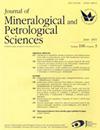印度西部Rakhabdev线性构造的蛇纹岩之谜:起源、变形特征和构造意义
IF 1
4区 地球科学
Q4 MINERALOGY
引用次数: 8
摘要
蛇纹矿物学控制着从海洋和大陆裂谷到俯冲环境中的断层流变,因此可用于识别古变形条件。来自印度拉贾斯坦邦的Rakhabdev线性构造提供了一个独特的机会来了解其从变形微观结构推断出的构造演化。然而,周围钙硅酸盐岩石的复杂性导致了对这些蛇纹岩起源的长期争论。由于完全的蛇纹石化和交代作用使烃源岩发生完全蚀变,蛇纹岩的烃源岩也无法预先确定。在本研究中,使用拉曼光谱对蛇纹石矿物进行了分析,以准确表征其分子结构。反蛇纹石-各种蛇纹石矿物的存在表明Rakhabdev蛇纹石起源于上地幔条件。Rakhabdev的反Gorite蛇纹岩是地幔物质的水化产物,从EPMA数据中获得的Mg#值较高。微观结构和EBSD分析还表明了两个变形阶段,上地幔条件下的反gorite变形,随后是浅地壳碳酸盐交代作用和随后的碳酸盐岩变形,后期为方解石脉侵入。这导致出现了与方解石、白云石、滑石、透闪石和绿泥石接触的反Gorite。因此,地幔楔反蛇纹石的剥露表明了一个古俯冲带,最终形成了地壳规模的碰撞边界,表现为形成Rakhabdev线性构造的弧形不连续体。本文章由计算机程序翻译,如有差异,请以英文原文为准。
Serpentinite enigma of the Rakhabdev lineament in western India: Origin, deformation characterization and tectonic implications
Serpentine mineralogy controls fault rheology in the ocean and continental rift settings to subduction settings and hence can be used to discern the paleo deformational conditions. The Rakhabdev lineament from Rajasthan, India, provides a unique opportunity to understand its tectonic evolution inferred from the deformation microstructures. However, the complexity of surrounding calc – silicate rocks had resulted in a long – driven debate on the origins of these serpentinite rocks. The source rocks of the serpentinites also cannot be determined pre-viously due to complete serpentinization and metasomatism rendering complete alteration of the source rocks. In this study, the serpentinite mineral was analyzed using Raman spectroscopy to accurately characterize its molecular structure. The presence of the antigorite – variety of serpentine mineral indicate towards the origin of Rakhabdev serpentinites in the upper mantle condition. The antigorite serpentinite of Rakhabdev is a hydration product of mantle materials showing high Mg# values obtained from EPMA data. The microstructural and EBSD analysis also indicates two stages of deformation, with deformation of antigorite at upper mantle conditions, followed by their shallow crustal carbonate metasomatism and subsequent deformation of the carbo-nates, with later stage calcite vein intrusion. This resulted in the appearance of antigorite in contact with calcite, dolomite, talc, tremolite, and chlorite. The exhumation of mantle wedge antigorite serpentinite is, therefore, indicating a paleo – subduction zone culminating in a crustal – scale collision boundary expressed as arcuate dis-continuous bodies forming the Rakhabdev lineament.
求助全文
通过发布文献求助,成功后即可免费获取论文全文。
去求助
来源期刊
CiteScore
1.80
自引率
14.30%
发文量
5
审稿时长
>12 weeks
期刊介绍:
The Journal of Mineralogical and Petrological Sciences (JMPS) publishes original articles, reviews and letters in the fields of mineralogy, petrology, economic geology, geochemistry, planetary materials science, and related scientific fields. As an international journal, we aim to provide worldwide diffusion for the results of research in Japan, as well as to serve as a medium with high impact factor for the global scientific communication
Given the remarkable rate at which publications have been expanding to include several fields, including planetary and earth sciences, materials science, and instrumental analysis technology, the journal aims to encourage and develop a variety of such new interdisciplinary scientific fields, to encourage the wide scope of such new fields to bloom in the future, and to contribute to the rapidly growing international scientific community.
To cope with this emerging scientific environment, in April 2000 the journal''s two parent societies, MSJ* (The Mineralogical Society of Japan) and JAMPEG* (The Japanese Association of Mineralogists, Petrologists and Economic Geologists), combined their respective journals (the Mineralogical Journal and the Journal of Mineralogy, Petrology and Economic Geology). The result of this merger was the Journal of Mineralogical and Petrological Sciences, which has a greatly expanded and enriched scope compared to its predecessors.

 求助内容:
求助内容: 应助结果提醒方式:
应助结果提醒方式:


